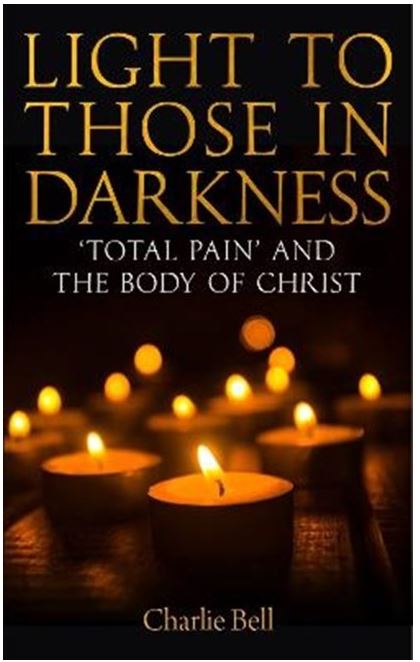Review by James Woodward
February 2024

Charlie Bell is a force of nature. Dogged, passionate, intelligent, and grounded are some of the virtues and characteristics that have shaped his learning and writing. A qualified psychiatrist lecturing in medicine at the University of Cambridge, he found the time to be formed for ordination and serves as a curate in Kennington in the Diocese of Southwark. Many have been enriched by his commitment to inclusion and fearless calling out on some of the thinking and practices that diminish and disfigure the Christian community. He wants to make a difference to the quality and life of Christian witness and especially in putting theology to work for our mutual flourishing.
This book is multifaceted and interdisciplinary. He explores two core questions: The first relates to the concept of total pain* and how we might enable ourselves and others to embrace the darkness that pain can bring. This pervading reality is situated within an invitation and affirmation to live within the Christian tradition. Bell describes this as the inter-relationship between doctrine and prayer… a tapestry of light within the witness of the Saints.
In these nuanced and generous nine chapters, the book argues that a belief in the communion of Saints can help us to understand, embrace and deal with the pain that comes from human trauma. Bell moves between the narratives and experiences in his formation as a priest, doctor, and teacher to show his reader what the nature of pastoral presence and engagement looks like in the face of our human condition.
Most writers are shaped by the lives and work of others. Bell acknowledges those individuals and communities that have supported him in the Academy, The National Health Service, and the Church. He is honest about the way in which the loss of his father simulated years of thinking about the meanings of death and dying.
It could be that much of our theology is rooted within our own perplexities and vulnerabilities as part of the way we search for truth and make meaning. This is a strand of Bell’s exploration here combined with his conviction in the relevance and agency of our understanding the shape of Christian believing and doctrine.
Part one of the book sets the scene within the liturgical heritage of the Church of England affirming that doctrine is a gift to pastoral practice. Bell explores and discusses pain in chapter two and then the concept of total pain for theology. Bell works within the Anglican Communion tradition of the five marks of mission and throughout these early chapters invites his readers to consider fundamental questions for Christian discipleship. How do we seek the mind of God? What are we to make of what happens beyond death? How do we deal with grief and loss? Where is the new learning within the tapestry of our human experience? Chapter five is a creative exercise in applied theology. Here Bell is at his strongest theologically as he offers a vision of faith and communion as a social reality that invites participation. We are shown why doctrine is a fundamental part of our praying and pastoring. We need constantly to be examining the shape and texture and depth of our believing as it shapes our belonging. Communion therefore is integral to Christian doctrine (p 80) and can be understood as social reality, soteriology, and social participation.
Part two of the book moves into a conversation between the concept of total pain and Christian doctrine. A clear description of a holistic anthropology gives Bell a basis upon which to challenge some issues of sociality and justice.
‘Lies and well-meaning statements about the importance of hope do not address the realities of total pain; instead, they silence the experiences of those who suffer. In so doing, they do not proclaim a strengthened Christian doctrine but a weakened one. Total pain does not disappear by being ignored.’ (p96).
It follows therefore that the dying have much to teach us not least in what they can reveal to us about the Christian life in its totality. In this narrative there is a firm and rooted optimism as we are invited to consider how we express and inhabit hope.
Chapter eight offers some insights for ministry and pastoral practice. It is refreshing to read a clear apologetic for the role of liturgy within ministerial practice. In this, the heart of the minister in her relationality and presence is a key part of the faithfulness of discipleship. In this presence our ability to accompany by listening and through a heart which can inhabit, and express kindness is a powerful and challenging appeal amidst such busy and distracted living. This may mean slowing up to notice. In paying attention, we might sense the other and their needs and pain.
I have two reservations and questions. I think the text would have been enhanced with the use of experience and story to ground this extended theological reflection. This may have been particularly useful in the definition and discussion of the concept of total pain. It might have been good to hear how a variety of individuals perceive, feel, and describe what pain means for them. We are all changed by our engagement with the darker and more complex parts of human life as well as those moments of light and connection which help give us a spiritual purpose.
My second observation is easily expressed but more problematic for any theologian. The problem of suffering and ultimately of theodicy is much more complicated than Bell allows for. I spent a year at Saint Christopher’s Hospice before theological college when the late Dame Cicely Saunders (the first to conceive the notion of total pain) was the Medical Director.
I carry with me her example and invitation to hold the silence of pain and not to be distracted by easy answers. Indeed, she often said that God was not to be let off the hook. I think I have yet to read anything that quite satisfactorily deals with the reality of suffering alongside a conviction of a Loving, Creator God. Can we continue to defend the rationality of both an all-powerful and all loving God in the face of total pain? There are of course other narratives that seek to explore these issues of agency and Providence. Christian Doctrine can rarely be viewed as a consistent tradition of knowledge that is free from contestation, ambiguity, and complexity. This is one of the reasons why we need to dig deeply into its traditions.
This is a good book that should find its way onto reading lists and coffee tables of those being formed for ministry and others who want to renew and refresh their practice. Certainly, I hope to use some sections of this work for ministry students here in Salisbury.
###
*Total pain is a concept introduced by the late Dame Cicely Saunders, a palliative care pioneer who founded the modern hospice movement and transformed the way society viewed care for the dying. Total pain is the idea that suffering encompasses all of a person’s physical, psychological, social, spiritual, and practical struggles.
Light to Those in Darkness: ‘Total Pain’ and the Body of Christ by Charlie Bell is published by SCM Press (2023)
The Revd Dr Charlie Bell is the author of Queer Holiness: The Gift of LGBTQI People to the Church, an academic psychiatrist at King’s College, London, and Fellow at Girton College, Cambridge.
The Revd Canon Professor James Woodward is Principal of Sarum College. View his full bio
Courses on related themes:
Faith in a Time of Dementia – The Other Side of Nothingness (13 March 2024)
The Practice of Spiritual Care (13 May 2024)

Leave a Reply
You must be logged in to post a comment.